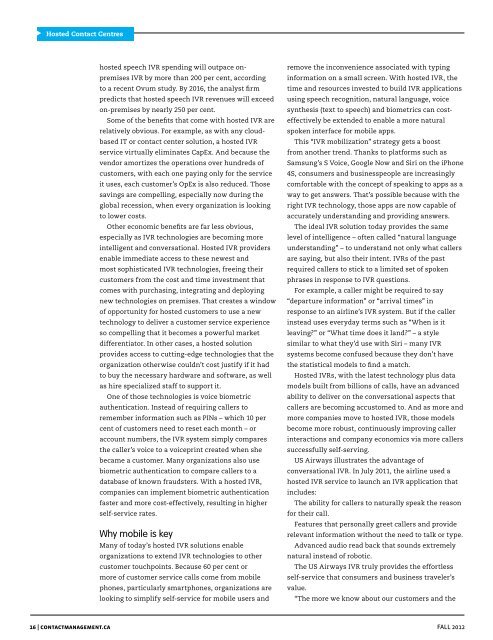Channel overload! - Contact Management
Channel overload! - Contact Management
Channel overload! - Contact Management
You also want an ePaper? Increase the reach of your titles
YUMPU automatically turns print PDFs into web optimized ePapers that Google loves.
Hosted <strong>Contact</strong> Centres<br />
hosted speech IVR spending will outpace onpremises<br />
IVR by more than 200 per cent, according<br />
to a recent Ovum study. By 2016, the analyst firm<br />
predicts that hosted speech IVR revenues will exceed<br />
on-premises by nearly 250 per cent.<br />
Some of the benefits that come with hosted IVR are<br />
relatively obvious. For example, as with any cloudbased<br />
IT or contact center solution, a hosted IVR<br />
service virtually eliminates CapEx. And because the<br />
vendor amortizes the operations over hundreds of<br />
customers, with each one paying only for the service<br />
it uses, each customer’s OpEx is also reduced. Those<br />
savings are compelling, especially now during the<br />
global recession, when every organization is looking<br />
to lower costs.<br />
Other economic benefits are far less obvious,<br />
especially as IVR technologies are becoming more<br />
intelligent and conversational. Hosted IVR providers<br />
enable immediate access to these newest and<br />
most sophisticated IVR technologies, freeing their<br />
customers from the cost and time investment that<br />
comes with purchasing, integrating and deploying<br />
new technologies on premises. That creates a window<br />
of opportunity for hosted customers to use a new<br />
technology to deliver a customer service experience<br />
so compelling that it becomes a powerful market<br />
differentiator. In other cases, a hosted solution<br />
provides access to cutting-edge technologies that the<br />
organization otherwise couldn’t cost justify if it had<br />
to buy the necessary hardware and software, as well<br />
as hire specialized staff to support it.<br />
One of those technologies is voice biometric<br />
authentication. Instead of requiring callers to<br />
remember information such as PINs – which 10 per<br />
cent of customers need to reset each month – or<br />
account numbers, the IVR system simply compares<br />
the caller’s voice to a voiceprint created when she<br />
became a customer. Many organizations also use<br />
biometric authentication to compare callers to a<br />
database of known fraudsters. With a hosted IVR,<br />
companies can implement biometric authentication<br />
faster and more cost-effectively, resulting in higher<br />
self-service rates.<br />
Why mobile is key<br />
Many of today’s hosted IVR solutions enable<br />
organizations to extend IVR technologies to other<br />
customer touchpoints. Because 60 per cent or<br />
more of customer service calls come from mobile<br />
phones, particularly smartphones, organizations are<br />
looking to simplify self-service for mobile users and<br />
remove the inconvenience associated with typing<br />
information on a small screen. With hosted IVR, the<br />
time and resources invested to build IVR applications<br />
using speech recognition, natural language, voice<br />
synthesis (text to speech) and biometrics can costeffectively<br />
be extended to enable a more natural<br />
spoken interface for mobile apps.<br />
This “IVR mobilization” strategy gets a boost<br />
from another trend. Thanks to platforms such as<br />
Samsung’s S Voice, Google Now and Siri on the iPhone<br />
4S, consumers and businesspeople are increasingly<br />
comfortable with the concept of speaking to apps as a<br />
way to get answers. That’s possible because with the<br />
right IVR technology, those apps are now capable of<br />
accurately understanding and providing answers.<br />
The ideal IVR solution today provides the same<br />
level of intelligence – often called “natural language<br />
understanding” – to understand not only what callers<br />
are saying, but also their intent. IVRs of the past<br />
required callers to stick to a limited set of spoken<br />
phrases in response to IVR questions.<br />
For example, a caller might be required to say<br />
“departure information” or “arrival times” in<br />
response to an airline’s IVR system. But if the caller<br />
instead uses everyday terms such as “When is it<br />
leaving?” or “What time does it land?” – a style<br />
similar to what they’d use with Siri – many IVR<br />
systems become confused because they don’t have<br />
the statistical models to find a match.<br />
Hosted IVRs, with the latest technology plus data<br />
models built from billions of calls, have an advanced<br />
ability to deliver on the conversational aspects that<br />
callers are becoming accustomed to. And as more and<br />
more companies move to hosted IVR, those models<br />
become more robust, continuously improving caller<br />
interactions and company economics via more callers<br />
successfully self-serving.<br />
US Airways illustrates the advantage of<br />
conversational IVR. In July 2011, the airline used a<br />
hosted IVR service to launch an IVR application that<br />
includes:<br />
The ability for callers to naturally speak the reason<br />
for their call.<br />
Features that personally greet callers and provide<br />
relevant information without the need to talk or type.<br />
Advanced audio read back that sounds extremely<br />
natural instead of robotic.<br />
The US Airways IVR truly provides the effortless<br />
self-service that consumers and business traveler’s<br />
value.<br />
“The more we know about our customers and the<br />
16 | contactmanagement.ca FALL 2012













